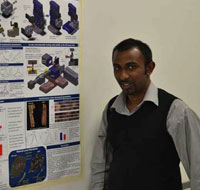Reply To:
Name - Reply Comment
 A Sri Lankan scientist, Angelo Karunaratne, in London, United Kingdom has been awarded the best doctoral thesis award in Biomechanics for his doctoral research work on ANALYSIS OF ALTERATIONS IN MATRIX QUALITY AT NANOSCALE IN METABOLIC BONE DISEASES USING SYNCHROTRON X-RAY DIFFRACTION at an international conference in Patras, Greece. The Best Doctoral Thesis in Biomechanics is an award with which the European Society of Biomechanics (ESB) recognizes the development of an outstanding doctoral final thesis that has contributed to the advancement of the theory and/or applications of Biomechanics.
A Sri Lankan scientist, Angelo Karunaratne, in London, United Kingdom has been awarded the best doctoral thesis award in Biomechanics for his doctoral research work on ANALYSIS OF ALTERATIONS IN MATRIX QUALITY AT NANOSCALE IN METABOLIC BONE DISEASES USING SYNCHROTRON X-RAY DIFFRACTION at an international conference in Patras, Greece. The Best Doctoral Thesis in Biomechanics is an award with which the European Society of Biomechanics (ESB) recognizes the development of an outstanding doctoral final thesis that has contributed to the advancement of the theory and/or applications of Biomechanics.
Angelo Karunaratne, Queen Mary University of London, became the first Sri Lankan to win this award. The Award committee chairman Prof. Peter Zioupos said: “The committee after scrutinised the award applications, CV, thesis, letters of support that applicants have provided, and Angelo has been chosen as the winner of Best doctoral thesis award with a large majority for his commendable achievements during the PhD”. Angelo gave an award keynote lecture at the ESB Congress 2013, where his work was highly appreciated by the research audience.
Angelo, aged 28, came to UK in 2005 for his undergraduate studies after completing his advanced level studies in Biology at St. Peter’s College, Colombo 04. During his period in St. Peter’s College he was good in studies, sports and conduct. Where sports concerned, he wore the cap of the College Athletic Captain for the year 2003. Once he arrived in London he has started his undergraduate studies in Medical Engineering at Queen Mary University of London where he graduated with a 1st class honours degree in Masters of Engineering in July, 2009. Then Angelo spent three months at Depuy Orthopeadics International as an intern research assistant performing lab based experiments.
Subsequently in October 2009, Angelo commenced work on a joint PhD studentship funded by QMUL and Diamond Light Source (DLS) at Harwell, UK. The research of his thesis was the application of in situ X-ray imaging techniques to understand the nanoscale origins of structure-function relations in metabolic bone diseases. Angelo explained “. The main focus of my PhD was to develop a nano-mechanical imaging technique to detect nano-structural and mechanical alterations in bone during metabolic diseases, such as osteoporosis and rickets. I was able to break new ground in our understanding of bone nano-structural and biomechanical alterations in disease conditions, using various imaging techniques and how they could be used as a diagnostic marker in bone pathology.”
His primary PhD supervisor, Dr. Himadri Gupta said “There is an increasing awareness in the field of clinical bone biomechanics that increased fracture risk and deformability in metabolic bone diseases cannot be explained by changes in bone quantity (Bone mineral density) alone, but that changes in the bone matrix quality at the nano- and microscale must be taken into account. However, the nature of these changes is far from clear. Angelo has made a major contribution in his PhD thesis toward clarifying this question, by demonstrating how high-brilliance synchrotron X-ray scattering combined with in situ mechanical testing can be used to detect the precise, disease-specific changes in the bone nanostructure leading to lowered mechanics in clinically important conditions like osteoporosis and osteoarthritis”.
Angelo’s external examiner, Dr. Sandra Shefelbine for his PhD thesis mentioned “The impact of this PhD work is not only insight into nano-mechanics of bone, but also development of protocols to probe the nanomechanics of bone in healthy, aged and diseased bone. The quantity and the quality of work achieved is obvious by the four publications in high impact factor journals that Dr. Karunaratne has published as first author, and likely more to come”.
At present Angelo is working as a research associate at the Centre for Blast Injury studies, Imperial College London and his academic advisor is Prof. Anthony Bull (head of department and the director of the Blast centre). He is enjoying his research at Bioengineering department, Imperial College and he said: “The aim of my current research at Imperial is to investigate the effects of high strain rate loading scenarios on the bone and cartilage, such as those seen in explosions and inform improvements needed for mitigation techniques and better clinical interventions on skeletal fixations for injured service men and women. I am glad that I have chosen this career path as I want to work in a medical environment that is also socially responsible and has the same belief and passions as I do. My future intention is to return back to Sri Lanka and provide a service to my country with the knowledge and the experience that I gained during my stay in UK”.
Finally Angelo added few words by acknowledging his supervisors, colleagues and family. “First and foremost, I would like to express my sincere gratitude to my PhD supervisors for their guidance throughout the three year period of my PhD. Last but not least, my loving wife - Romanie, daughter - Riyana and son- Adithya who always with me during my work and putting a smile on my face. You are my strength, without you this holds no value.”